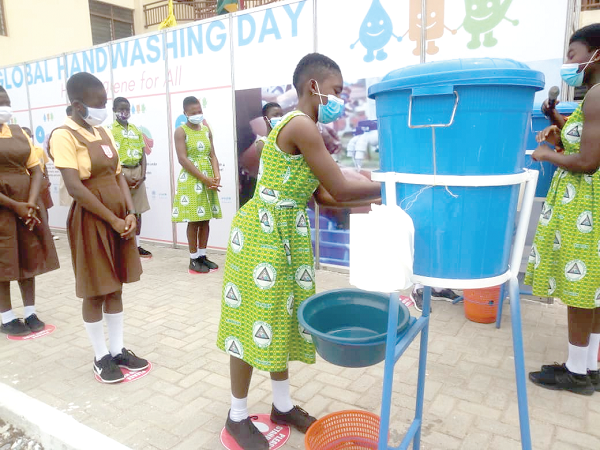
Global Handwashing Day marked
The Ghana Education Service (GES) yesterday joined millions around the world to commemorate Global Handwashing Day, with a call on the public to continue washing their hands regularly as it was the surest way to prevent contracting diseases.
The day, established in 2008, is marked on October 15 every year to increase awareness and understanding of washing hands with soap to prevent diseases and save lives.
Advertisement
This year’s Global Handwashing Day was held on the theme: “Hand hygiene for all”.
On the day, a durbar was held at the Nii Kojo Ababio Cluster of Schools in Accra, where students from selected schools demonstrated the proper way of handwashing and further pledged to be ambassadors of handwashing in their various schools.
Present at the event were representatives from the United Nations Children’s Fund (UNICEF), the Ministry of Sanitation and Water Resources (MSWR) and the Greater Accra Regional Directorate of Education, as well as traditional leaders.
The UNICEF presented 120 Veronica buckets to the GES and the MSWR for onward distribution to selected schools in the Greater Accra Region to encourage handwashing among students and pupils of the beneficiary schools.
No cholera outbreak
The Minister of Sanitation and Water Resources, Mrs Cecilia Dapaah, said the importance of regular handwashing had been brought to the fore more strongly following the outbreak of the coronavirus pandemic globally.
She said handwashing had proved to be one of the most effective ways of dealing with disease outbreak, saying it was also the most cost-effective way.
Mrs Dapaah indicated that as a result of the collective effort by the government and individuals to practise good hygiene, including promoting handwashing and sanitation, the country had not witnessed any outbreak of cholera since 2017.
She, therefore, urged Ghanaians to continue to observe good hygiene and sanitation, including regular handwashing.
“We are all aware that frequent handwashing is one of the key protocols prescribed by experts in the fight against coronavirus and it is the reason why we have kept the disease in check in this country and so I will urge all of us to continue doing that.
“Additionally, since good hygiene promotes good health, let us resolve to make handwashing a top priority and wash our hands with soap after going to the toilet and before handling food,” Ms Dapaah stressed.
Make handwashing a habit
In a speech read on behalf of the Minister of Education, Dr Matthew Opoku Prempeh, he encouraged all and sundry to make washing of their hands with soap under running water a regular habit, given the significant part it played in preventing diseases.
“Having access to handwashing facilities such as soap and water is an important step to good health but this needs to be complemented with actions to move handwashing behaviour from individual and societal level to making it a long-term habit and a norm,” he said.
Dr Prempeh expressed appreciation to UNICEF for its support at promoting and encouraging handwashing in schools, saying, “this intervention will impact meaningfully on academic performance including retention among schoolchildren.
Handwashing facilities
The UNICEF Representative to Ghana, Ms Anne-Claire Dufay, stressed the importance of handwashing which she said had multiple short and long-term benefits.
“Available research from the Centre for Disease Control indicates that “handwashing reduces the risk of diarrhoeal disease by 40 per cent.
“Acute respiratory infections and COVID-19 can also be reduced by 20 per cent and 36 per cent respectively, according to the Global Handwashing Day 2020 fact sheet,” she said.
Hand hygiene for all
Ms Dufay observed that despite the simplicity of hand hygiene practice, many people did not have access to facilities to practise it.
She said the lack of access to hand hygiene facilities extended beyond the home to schools, workplaces and healthcare facilities.
“According to data from the Education Management Information Systems 2018/2019 report, in Ghana, only 32 per cent of all public and private schools had access to water for hand washing,” she added.
She said to achieve “hand hygiene for all”, the public ought to invest and commit to the practice, adding that “it is everybody’s responsibility to wash their hands to stay safe at all times”.




